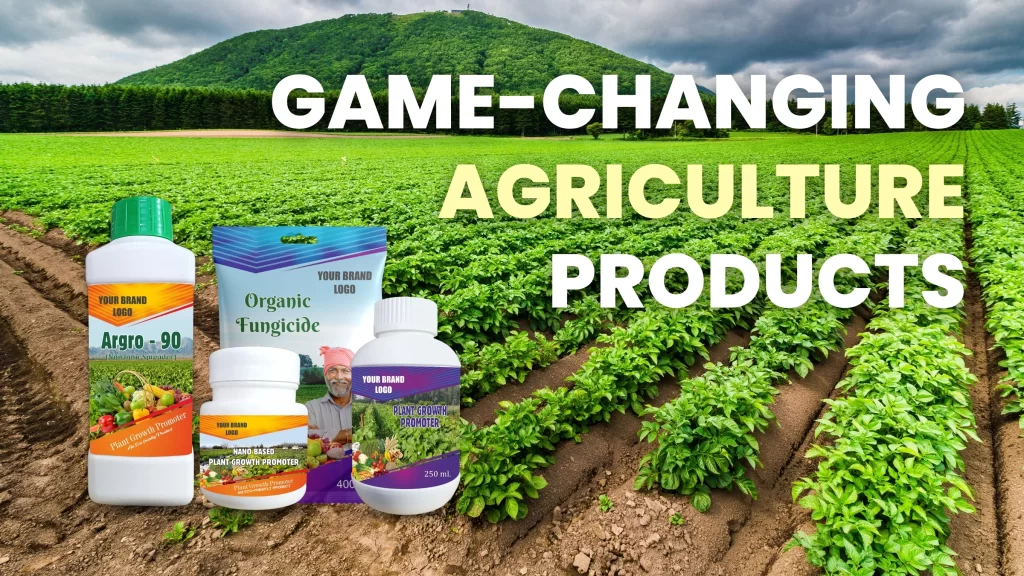Just about everything roughly connected to embarking from scratch or saving face on an already existing agricultural venture comes with extremely select products that yield enhancement in productivity, build up soil health, and sustainable solutions. Quality agricultural solutions impact not only on yield per hectare but also on the viability of farming practices sometimes far into the future. This list in the article shall present the top agricultural products, raising a fresh start for farmers and agri-businesses; their benefits and practical applications are to be discussed.
Best Agricultural Products
1. Organic Fertilizers: Nurturing Soil Health
Each farming process is based on the fertile soil. Organic fertilizers work efficiently to enrich the structure of the soil and encourage microbial activity. Organic fertilizers usually release their nutrients slowly, thus a constant supply to crops ensures that leaching is very unlikely.
Benefits of Organic Fertilizers:
- Improved Soil Structure: Organic matter is responsible for the increase in soil aeration and water-holding capacity, which contributes to strong root development.
- Enhanced Microbial Activity: Organic soils provide a proper place for beneficial soil microorganisms to thrive in, contributing to the cycling of nutrients and suppression of disease.
- Environmental Sustainability: Organic fertilizers keep chemical runoff at bay, ensuring safety for aquatic organisms while helping biodiversity flourish.
Practical Tip: Regular soil tests will indicate the deficiency of nutrients and aid in decision-making regarding the time and amount of organic fertilizer to be applied with the optimal goals of nutrient availability that avoid over-applications.
2. Biofertilizers: Harnessing Beneficial Microorganisms
Biofertilizers are such preparations based on living microorganisms, which, when applied to seeds or plant surfaces or soil, act positively by enhancing the tillability of primary nutrients. Less chemical alternate and helpful to agriculture sustainable in nature.
Benefits of Biofertilizers:
- Nitrogen Fixation: Some biofertilizers are capable of converting atmospheric nitrogen into forms accessible to plants, thus reducing reliance on synthetic nitrogen fertilizers.
- Phosphorus Solubilization: Some microorganisms solubilize insoluble phosphorus compounds and convert them into forms available to plants.
- Disease Resistance:Biofertilizers can suppress soil-borne pathogens, thereby decreasing the incidence of diseases.
Practical Tip: Use biofertilizers together with organic fertilizers to synergistically improve soil fertility and emergence of plants. Ensure that microbial inoculants are stored properly.
3. Plant Growth Promoters: Stimulating Vigorous Development
Plant growth regulators (PGRs) are substances promoting the plant growth associated with other plant hormones. PGRs are substances other than traditional fertilizers that stimulate various physiological processes in plants.
Benefits of Plant Growth Promoters:
- Enhanced Root Development: PGPs stimulate the growth of roots, enhancing their ability to absorb nutrients and water.
- Increased Stress Tolerance: They increase plant resilience against drought, salinity, and all other abiotic stresses.
- Improved Flowering and Fruiting: PGPs can increase both the quantity and quality of flowers and fruits, therefore, raising the yield.
Practical Tip: Apply plant growth promoters during critical growth stages such as seedling establishment and flowering stages where their influence would be maximally felt, while fulfilling the dosage requirement to avoid cases of phytotoxicity.
4. Non-Ionic Spreaders: Ensuring Effective Agrochemical Application
Well-coordinated application of agrochemicals is very important in the management of pests and diseases. Non-Ionic spreaders are adjuvants allowing the coverage to be broadened on pesticides and fertilizers applied to plant surfaces and the adhesion and penetration into plant tissues.
Benefits of Non-Ionic Spreaders:
- Uniform Coverage: Surface tension is reduced, enabling even distribution of agrochemicals.
- Increased Efficacy: Enhanced efficacy due to better penetration so that active ingredients can reach target sites within plants.
- Cost-Effectiveness: More efficient use properties that can reduce required quantities of purchased agrochemicals, lowering input costs.
Practical Tip: When one utilizes non-ionic spreaders, be sure to adhere to the recommended concentrations and compatibility guidelines so there is no adverse reaction with agrochemicals.
5. Nano-Based Plant Growth Promoters: Innovating Agriculture
Nanotechnology birthed new dimensions in agriculture, including nano-based plant growth promotants. These products depend on nanoparticles to deliver nutrients and bioactive compounds in a most effective way to plants.
Benefits of Nano-Based Plant Growth Promoters:
- Enhanced Nutrient Uptake: Enhanced nutrient uptake by the delivery of nutrients in a controlled manner, at the cellular level by nanoparticles.
- Reduced Environmental Impact: Lower application rates needed therefore reducing potential for environmental contamination.
- Targeted Action: Controlled release of nutrients, based on plant requirements through nano-formulations targeted action.
Practical Tip: Stay informed about the latest research and regulatory guidelines on nano-based agricultural products to ensure safe and effective use.
6. Climate-Resilient Seed Varieties: Adapting to Changing Conditions
Though climate change brings about unpredictable weather patterns and pest pressures that affect agriculture, the bringing in of climate-resilient seed varieties would help to counter such challenges.
Benefits of Climate-Resilient Seeds:
- Drought Tolerance: These varieties that can withstand water constraints and keep up yields.
- Pest and Disease Resistance: Enhanced resistance to pests and diseases reduces dependence on chemical pesticides.
- Yield Stability: Capability to maintain productivity status under changing climatic conditions.
Practical Tip: Collaborate with local agricultural extension services to select seed varieties best suited to your region’s climate and soil conditions.
7. Artificial Intelligence Tools: Modernizing Farm Management
In agriculture, AI boosts decision-making and productivity through data insight. AI tools can perform many tasks, including crop monitoring and predictive analytic tasks.
Benefits of AI in Agriculture:
- Precision Farming: This AI allows for specified management for crops based locally, optimizing inputs and output yields.
- Early Pest Detection: Early detection of pest infestation via machine learning algorithms ensures timely interventions.
- Resource Optimization: AI is instrumental in optimizing water and nutrient management, thereby reducing wastage and related costs.
Practical Tip: Invest in user-friendly AI tools and ensure proper training for farm personnel to fully leverage these technologies.
8. Carbon Farming Initiatives: Contributing to Sustainability
In short, carbon farming means to use practices that increase the amount of carbon sequestering in soils, trapping more carbon in the soil for climate-change mitigation while promoting better soil health.
Benefits of Carbon Farming:
- Soil Fertility: Soil organic matter enrichment enhances availability of soil nutrients and improves soil structure.
- Financial Incentives: Participation in carbon credit markets can provide additional income streams.
- Ecosystem Services: Improved soil health supports biodiversity and water retention.
Practical Tip: Explore local and international carbon credit programs to understand the requirements and benefits of participating in carbon farming initiatives.
Akshay Enterprises: Your Trusted B2B Supplier for Agricultural Products
When it comes to high-quality agricultural products, choosing the right supplier is of utmost importance. Among the few trusted B2B suppliers, Akshay Enterprises presents a mix of products which will sustainably improve agricultural productivity.
Product Offerings:
- Argro – 90 (Non-Ionic Spreader): Works in effective application of pesticides with an even spread and penetration.
- Bhu Harit Prabha: An organic fertilizer that enriches the soil fertility and is good for the healthy growth of plants.
- Nano-Based Plant Growth Promoter: Using nanotechnology, this product enhances the plant’s ability to take up nutrients and develop strong plants.
- Plant Growth Promoter:This product will help boost the total vigor of the plant, leading to increased yields and quality produce.
Why Choose Akshay Enterprises:
- Quality Assurance: Commitment to providing products that meet stringent quality standards.
- Sustainable Solutions: Focus on eco-friendly products that promote long-term agricultural sustainability.
- Customer Support: Dedicated support for bulk buyers, wholesalers, and retailers to ensure seamless transactions



